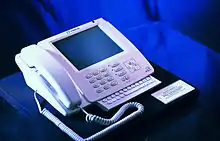Linksys iPhone
The Linksys iPhone was a line of internet appliances from Cisco Systems. The first iPhone model – released by Infogear in 1998[1][2] – combined the features of a regular phone and a web terminal. The company was later purchased by Cisco and no new products were marketed under the name between 2001 and 2006. At the end of 2006, Cisco rebranded its Linksys VoIP-based phones under the name, shortly before Apple released an iPhone of its own. This led to a trademark dispute between the two companies, which was resolved on February 20, 2007.
InfoGear iPhone


The first iPhone was released in 1998 by InfoGear Technology Corporation. In 1997, prior to the release of iPhone, Infogear entered into a partnership with Cidco of Morgan Hill, California.[3] The iPhone was an innovative internet appliance that featured a sliding keyboard and an LCD touchscreen that accessed an embedded web browser and an email client. It was one of the first wave of internet appliances, preceding the I-Opener, 3Com Audrey and a slew of similar devices from various manufacturers including Alcatel and Nortel. Reviewers praised it for offering a simple and "relatively inexpensive" way to access the Internet, but many criticized its size, lack of features, and US $5 per month in addition to the Internet access charge and the purchase price (US $299).[4][5] Infogear was acquired by Cisco Systems in 2000,[6] A new model was introduced in 2001, but the product was soon discontinued.
On December 18, 2006, Cisco Systems rebranded an existing line of Linksys Voice over IP internet phones, as it introduced some additional models.[7]
Linksys was acquired by Cisco in June 2003, long after the production of Infogear iPhone had ceased.[8] Unlike its name-sake predecessor, the new iPhone devices use an existing network and proprietary protocols, such as Skype. Rebranding did not involve any feature changes or introduction of new proprietary technology.
Netgear continues the iPhone line under new name
iPhone technology previously sold by Linksys was previously, but no longer, available from Netgear as the Netgear SPH200D. Handsets for the two are interchangeable. Linksys never sold additional handsets, leaving Linksys CIT400 users with only one handset although the base station for the CIT400/SPH200D supports up to four. The Netgear SPH150D supplemental handset fills that gap.
Apple iPhone and trademark dispute
On January 9, 2007, Steve Jobs announced that Apple Inc. would begin selling its mobile smartphone called iPhone in June of that year. Cisco announced shortly after the announcement that Apple had been in negotiations to use the trademark that Cisco acquired with the purchase of Infogear. However, a day later they announced that they were filing a lawsuit against Apple.[9]
Apple and Cisco settled their dispute on February 20, 2007. Both companies will be allowed to use the "iPhone" name in exchange for "exploring interoperability" between Apple's products and Cisco's services and other unspecified terms.[10]
References
- The forgotten story of the original iPhone released in 1998, Brian McCullough, Internet History Podcast, June 21, 2015
- What the first ‘iPhone’ looked like… back in 1998, Yoni Heisler, bgr.com, Aug 11, 2015
- Alliances advance iPhone: Cidco, InfoGear strike partnerships to further screen phone's future
- Telephone meets touch-screen Internet appliance, CNN November 2, 1998
- Gadget: iPhone Archived 2007-09-27 at the Wayback Machine, streettech.com
- iPhone Support Archived 2007-01-17 at the Wayback Machine, cisco.com
- iPhone--Linksys, linksys.com
- Linksys Acquired by Cisco Systems, Inc., linksys.com (from company profile)
- Cisco (January 10, 2007). "Cisco Sues Apple for Trademark Infringement". newsroom.cisco.com. Retrieved 2007-01-28.
- Cisco and Apple Reach Agreement on iPhone Trademark Archived 2008-03-25 at the Wayback Machine, apple.com
